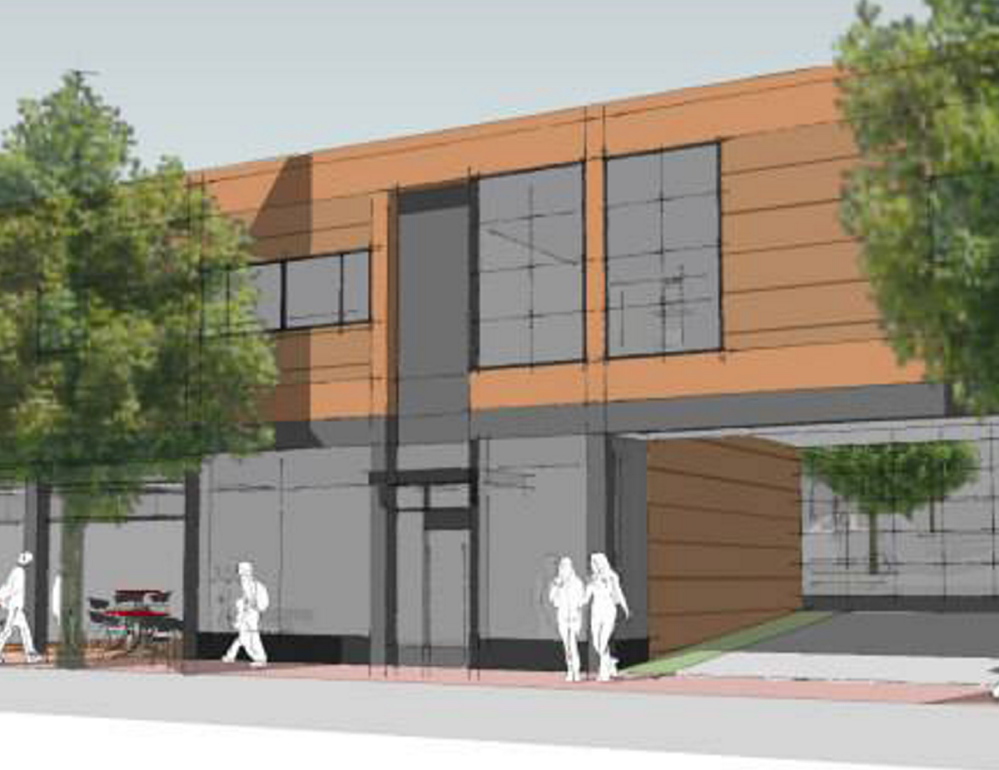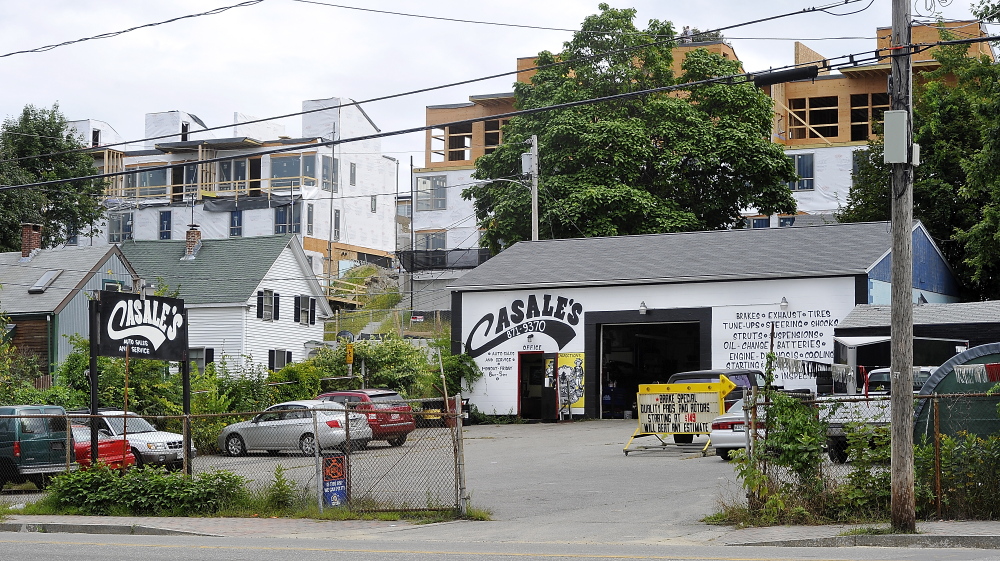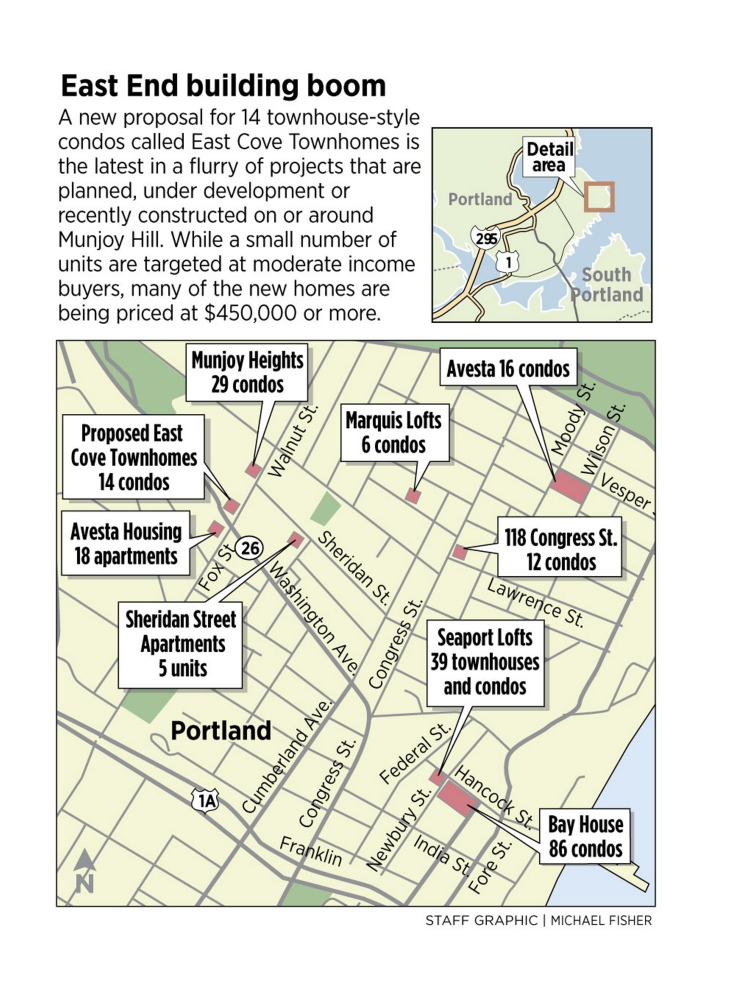Local developers are looking to build 14 townhouse-style condominiums priced at more than $450,000 each at the edge of Munjoy Hill, a neighborhood that was once considered unsafe but is now seeing a spike in high-priced housing development.
Business partners Ron Gan and Jed Rathband are seeking a zoning change for 145-155 Washington Ave., at the corner of East Cove Street, and are scheduled to go before the Portland Planning Board on Tuesday. It’s the latest example of what has been described as a real estate feeding frenzy in the city’s East End.
“As developers we want to go where the market is, and the market is Munjoy Hill,” said Rathband, a real estate broker and developer with Keller Williams Realty.
Rathband said the East Cove Townhomes would be three levels, with 10 of the homes featuring three bedrooms and three baths and the others with two bedrooms and two baths. Prices for the 1,800-square-foot units start at $459,000.
The development would also feature 1,500 square feet of commercial space, which they hope to fill with a bakery, café or small restaurant. Rathband said that there will also be space above the retail space for either two additional studio flats or office space. He said the development is aimed at empty-nesters and “urbanites.”
“We began to market them just last week and we already have one unit under contract,” Rathband said last week, adding that a young family with a child bought the first property. “And this is the doldrums of summer, so we believe it will do quite well.”
THE ‘LAST FRONTIER’
Even with a dramatic increase in land values here in recent years, Rathband calls the Munjoy Hill area the “last frontier” for development on the Portland peninsula.
“We knew we wanted to be on the peninsula and knew that there were very few places left to be developed,” Rathband said.
Other projects include a Redfern Properties development for a 29-townhouse condominium on nearby Walnut Street called Munjoy Heights, with homes costing $540,000 to $700,000.
The East Cove project would be located across the street diagonally from an 18-unit efficiency apartment building planned by Avesta, a Portland-based nonprofit that wants to preserve affordable housing in the city.
“That is the kind of diversity we want in the neighborhood, economically and otherwise,” said Rathband, who lives near the proposed property. “It’s just amazing to see the level of interest here.”
But some residents – including Ross Fields, who is also a former board member of the Munjoy Hill Neighborhood Organization – worry the development boom is an early sign of gentrification in the neighborhood.
Fields said he wishes developers would look ahead to find ways to maintain a mix of housing that attracts and maintains a good socioeconomic mix in the neighborhood.
“I want to be able to continue to live here, I want those on a fixed income to be able to continue to live here, I want longtime residents to be able to continue to live here,” Fields said in an email. “I want those just starting out in their careers to be able to live here, I want the person who serves me at one of our local markets or eateries to be able to live here, without having to spend over 50 percent of their income on housing.”
Munjoy Hill started as a respectable working-class community and ultimately gained a reputation as an unsafe neighborhood in the 1980s and a place for prospective home buyers and tenants to avoid.
In recent years, the area has turned around as baby boomers and hipsters have moved in alongside art galleries and cafes, making Munjoy Hill one of the most coveted real estate markets in Portland.
Sean Turley, a Munjoy Hill Neighborhood Organization board member, said while the neighborhood has changed drastically since the 1980s, gentrification isn’t the right word to describe the transition. The look and nature of the area, Turley said, hasn’t changed much since new developments started breaking ground a few years ago.
“Gentrification implies a certain fundamental change and that hasn’t happened,” Turley said, adding that while prices are increasing, the community still feels the same. “The look and feel of Munjoy Hill has been constant.”
Rathband agreed that the townhouses’ design is more modern for the area, but the aesthetic is similar to the other development projects in place. He said keeping the homes to three floors remains in scale with the rest of Munjoy Hill.
“We recognize the potential of the neighborhood and what Portland will be,” Rathband said. “We’re buying at the low tide.”
EXCLUSIVE TOWNHOUSES
Rathband said they hope to line up seven pre-construction sales in order to receive financial approval from the bank.
“We realize that $459,000 is not going to be affordable to every young urbanite who wants to live on the peninsula, but we believe we can get a few,” he said.
The project, located on two lots – one currently occupied by an auto garage and one vacant –covers about 20,000 square feet. Rathband and Gan have an option to purchase the lots for just under $900,000, or about $42 per square foot.
The difference in price between the land today and the land 10 years ago is stark.
In 2003, the land at 145 Washington Ave. was bought for $39,000, according to city assessor’s records. The land and shed at 155 Washington Ave. were sold for $108,260 in 2002. The developers have agreed to pay six times as much for the two lots.
While the price seems high, Rathband said it’s cheaper than you would find farther up on Munjoy Hill. He also claims their project is more affordable – at $250 per square foot – than other projects in the neighborhood. Real estate listings indicate some nearby condos are selling for nearly $1 million.
Comparatively, a 1,657-square-foot condo with three bedrooms and two baths on Morning Street in the East End is selling for $879,000, or $530 per square foot.
Another 2,700-square-foot single-family home with four bedrooms and four baths is for sale on Sheridan Street, listed for $945,000 at $407 per square foot.
Rathband said he hopes the plans are approved by the end of October to convert the townhouse presales to contracts. Once approved, work would start by the end of February or early March to be finished by the end of 2015.
Chelsea Diana can be contacted at 791-6337 or at:
cdiana@pressherald.com
Twitter: ChelseaDiana_
Send questions/comments to the editors.





Comments are no longer available on this story